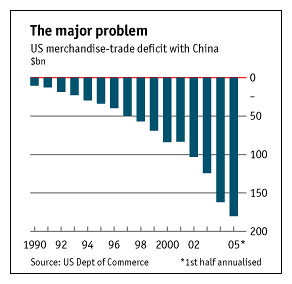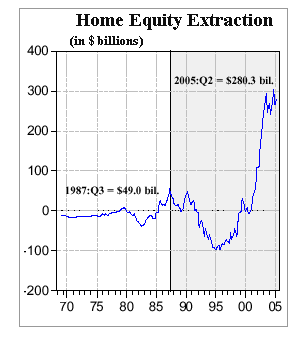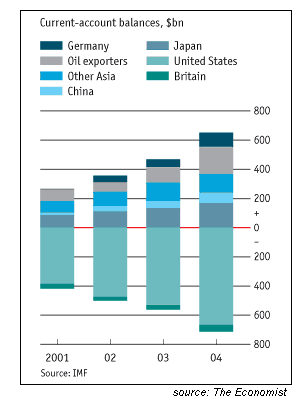

|
| weblog/wEssays archives | home | |
|
Will the Housing Bust Take Down China? (June 28, 2006)  Is China dependent on the U.S. consumer economy? This chart supports the obvious
answer: Yes.
Is China dependent on the U.S. consumer economy? This chart supports the obvious
answer: Yes.
And what is the U.S. consumer economy dependent on? Equity extracted from rising housing values. (see chart below.) And what is the result of the housing bubble deflating? No more equity extraction, and hence a drop in consumer spending and housing/lending-related employment. Shall we connect these two dots? As the housing bust drags the U.S. into a deep consumer-led recession, it will take the Chinese economy with it. There are a number of dynamics to consider, but this is the primary one: China depends heavily on its export market for the profitability and growth of its economy, and on the influx of foreign investment which has fueled that sector's white-hot growth.  Recall that some 40% of China's growth is direct foreign investment. Are these investors
pouring money into domestic markets such as agriculture and low-cost consumer good made
for the Chinese market? Of course not; the SOEs (state-owned enterprises) and other Chinese
companies have long been supplying inexpensive TVs, clothing, refrigerators, motorbikes, etc.
for the domestic economy.
Recall that some 40% of China's growth is direct foreign investment. Are these investors
pouring money into domestic markets such as agriculture and low-cost consumer good made
for the Chinese market? Of course not; the SOEs (state-owned enterprises) and other Chinese
companies have long been supplying inexpensive TVs, clothing, refrigerators, motorbikes, etc.
for the domestic economy.
With the exception of the automobile market, foreign investment--joint ventures, new factories, etc.--is largely aimed at the export market: building stuff in China to sell elsewhere. What happens to those hundreds of billions of foreign investment when exports to the U.S. plummet? It will drop, too, of course; why build yet another factory or distribution center when sales are falling? Do factories close in China? Yes, they do, just like they do everywhere else when demand falls, or tastes change, or recession takes out consumer spending.  But doesn't China's domestic market and other export markets make it invulnerable
to a U.S. recession? China expert Andrew J. Nathan doesn't think so. As he writes in the
July/August 2006 issue of Foreign Affairs:
But doesn't China's domestic market and other export markets make it invulnerable
to a U.S. recession? China expert Andrew J. Nathan doesn't think so. As he writes in the
July/August 2006 issue of Foreign Affairs:
Even the most astute analysis of current trends may not accurately predict the future. (CHS--first get the standard-issue pundit caveat out of the way.) Major changes in a society, as China's past amply illustrates, are often disjunctive. And so it is prudent to ask what events could derail whatever process is taking place in China today.As this chart shows, China is not alone in being heavily dependent on exports to the U.S. Indeed, it is difficult to examine this chart and then claim that a global recession is not inevitable as the housing bust ends the equity extraction which has propped up U.S. consumer spending for the past five years. For more on this subject and a wide array of other topics, please visit my weblog. copyright © 2006 Charles Hugh Smith. All rights reserved in all media. I would be honored if you linked this wEssay to your site, or printed a copy for your own use. |
||
| weblog/wEssays | home |